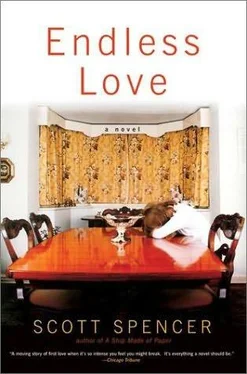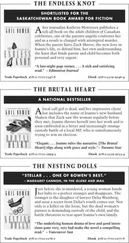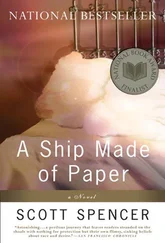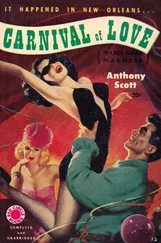“I know what you’re getting at,” Ann said. Her voice sounded dreamy, a little stoned. It was snowing everywhere north of Florida but she sounded like someone lying in the sun. “I don’t like you calling me, David. It’s too strange and it’s always unexpected. It’s not fair. It always means you’re prepared to talk and I’m not. But if you have to call me, at least make sure you’re not calling to trick me out of information about my kids.”
I wrote Sammy in care of the Beaumont School, congratulating him on tearing up Agnew’s pal’s check. When I was a novelty to the Butterfields, I used to trade on the fact of my parents’ political past. As far as I was concerned, I’d absorbed enough Marxism through osmosis to teach them all quite a bit about left-wing politics. But, as I wrote to Sammy, “here you are committing acts of real courage and I haven’t made a political gesture since high school, and even that was a silent vigil outside of a military installation in Evanston when I was with five hundred other people and no possible harm (or blame) could have befallen me.” Sammy didn’t answer my letter, or acknowledge it, but neither did he send it back torn into eighths. I knew I was beguiling myself, but I took this as a kind of encouragement. A week later, I sent him a letter to Jade and asked him to forward it to her.
A letter from Ann.
Dear David,
Poor you. First to have me hang up on you and then having to trudge down to the post office to get my letters which don’t fit into your mailbox. I’ve always helped myself to the privilege of irresolution when it came to you. You always seemed to revel in my ambivalence while the others tore out their hair. You were so certain that beneath my capriciousness I was a typical Yankee lady, as sure of her emotional priorities as she is of her lineage. I wonder if you still feel that. I would hope so. I’m certain no one else does. But now with yourself on the receiving end of my whimfulness, you’ll want to forget the pleasure you once took in the odd syncopation of my feelings.
Syncopated feelings? God, there is no one on either side of the grave upon whom I’d inflict that little phrase, except you. I realize you’ll put up with anything and you would do nothing to threaten this correspondence of ours. I finally understand why some women—or are they all just girls?—answer those box-numbered pleas from prisoners that run in the underground papers and write letters to some total stranger serving time in a penitentiary. Our history being what it’s been, there’s something about a bird in a cage that appeals to women.
Hugh was back in town—speaking of what appeals to women. His girl of the moment, Ingrid Ochester, is about twenty-seven, though she looks as old as Hugh. God only knows what’s aged her. She doesn’t really seem to do anything and her only worries are if the glaze will hold on her pots and vases and if her eight-year-old son will land safely in one of his constant shuttles between Ingrid and his father, a Pepsi exec in Saudi Arabia. Ingrid is the sort of woman I could never know, under any circumstances. Comfortable, vague, she seems to come out of nowhere, from nothing. Her past is full of towns like Camden, New Jersey; her parents summered in Easton, Maryland. They made their money selling sofas.
Hugh and I came from very different worlds, but in our case there was, at least, a pleasing polarity. He was from New Orleans and I was from New York, but our families both were faded rich (very faded) and they haunted and nagged at us in similar ways. But Ingrid and Hugh? Who could say what they hold in common; I can never even keep it straight how they met. There was somebody’s cousin, a flat tire…But clearly Ingrid is smitten—all of the kids say so—and Hugh revels in it like a cat on his fifth canary.
That’s what is so absurd about him. He is still amazed women fall in love with him and his ego is so weak (yet so insatiable) that he treats every dalliance as the affair of the century. Each time he feels himself the object of some lady’s affections, Hugh will seize the moment with all the rashness and power of his heart. For a man as dead-on attractive as Hugh, he has been dumped by an extraordinary number of women. He holds on with such intensity that your average young lady—who like your average young man simply wishes to enjoy life, for God’s sake—beats a hasty retreat. You know nearly as well as I do how wildly serious Hugh can be. How deeply he likes to think, how exactly he likes to remember, how fine and painful the calibrations of his emotions. A brooder, the silent type, Hugh’s liable to do things like get up in the middle of dinner, come to your chair and stand you up, and then put his arms around you and embrace you with great strength and solemnity, while you try not to chew your mouthful of food. Well, most women can’t take that kind of stuff.
There comes a certain point in one’s courtship with Hugh when one realizes this is not just something Hugh does to woo you, but this is actually the way he is. The cataloguing of events—our tenth paella dinner, the fifth anniversary of finding the house, our fifth anniversary of signing the papers for the house, our fifth anniversary of moving into the house. It doesn’t stop, it’s not some stunt, it goes on and on. Seventeen years of marriage and I’d put down my book and have to confront Hugh’s earnest blue eyes, staring silently at me from across the room, trying to fathom me. “Do you want to talk?” I’d say. But he didn’t; he wanted to “communicate.” Coming from a world of The Autocrat at the Breakfast Table, and adding to the general conversational din all my life, Hugh’s overwhelmingly significant silences had for me a deep sonority. And while my relationship to them gradually became ironic and subversive, I never truly tired of them. I never ceased to believe that his way was a higher path and that he had something crucial to teach me.
I used to believe that it was Hugh who pursued me, but the truth is that even his Cambridge pursuit was incurably diffident. Hugh sought me out after I published a story in a local lit. magazine called “Birth Pains.” The magazine was printed in blue ink on yellow paper and my contribution was so arch and pretentious—the usual twaddle about a me-ish young woman dying from her own cultivation and refinement—that I stayed out of sight for a week afterwards. But Hugh managed to find my piece enchanting and tracked me down. A stranger, he wrote me a formal note and asked to meet me for a daiquiri—in my story, the heroine drinks dozens and dozens of daiquiries—at the Parker House. The idea of meeting this well-mannered and apparently well-meaning stranger was too seductive to resist and I appeared at the Parker House wearing a black dress and a string of lilac-tinted glass beads. Hugh was in a double-breasted wheat-colored suit, holding a copy of “Birth Pains,” and drawling to beat the band. (He sensed I would respond to the cliché of the Southern Gentleman.) He advised me as to the extent of his admiration for my story, asked me how I had achieved my anemic, third-hand effects, and, on the whole, interviewed me rather as you yourself did many years later when you came home with those photocopies of my New Yorker stories. Except then I was a young, ornery girl in a hotel with a stranger, and a half hour into our conversation (and halfway through my second daiquiri—a perfectly horrid drink, of course) I was hoping that Hugh would make his praise complete by suggesting we take a room.
If I’d known then what I soon enough learned, it wouldn’t have been any more complicated than my saying, “Oh Hugh, I need to be with you”—Hugh would have been at the front desk in an instant, gulping so hard that his Adam’s apple would be leaping forth like a cuckoo clock. I had no idea of the depths of his shyness and susceptibility: in matters of the flesh, Hugh has always needed permission. The permission granted, he can be the goat of all goats, but before then he is withdrawn, or so tepidly flirtatious that it becomes inconceivable that a real libido lurks beneath. If it hadn’t been for his great good looks, Hugh would have been miserable: all he could do was make himself available; he could not reach out and take. But how was I to know? It took weeks of thought and frustration before I realized that if I was going to have Hugh, then I must initiate it. Thus the famous dinner party in which I announced as I lit the candles: “Abandon all hope of leaving, ye who enter here.”
Читать дальше












